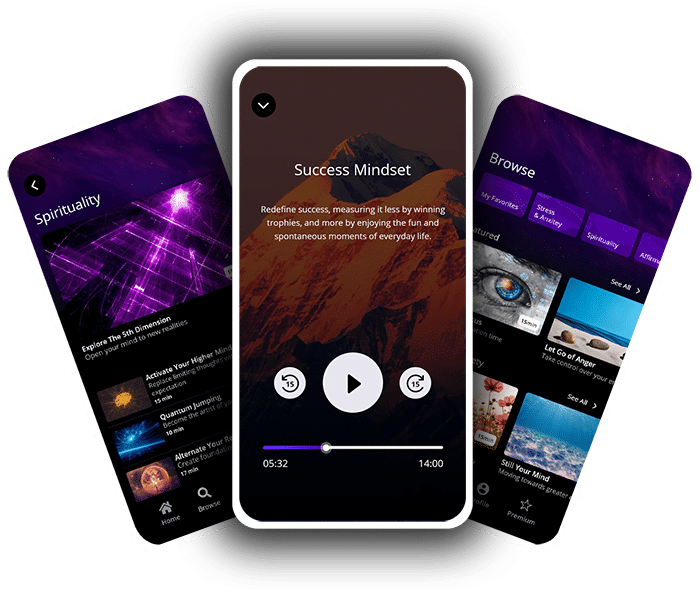Feeling stuck or unsure about your path can often leave you searching for deeper understanding. This article unveils 83 self reflection questions designed to spark significant personal growth and self-awareness.
Dive into these queries, and you’ll find a treasure trove of insights that can help navigate the complexities of life with newfound clarity. Keep reading to unlock the transformative power of self reflection!

Unleash Your True Potential!
Explore the world of meditation with our powerful guided sessions crafted to bring peace and strength to your spirit.
But first, let’s ensure our sessions are the perfect fit for you.
Take our short quiz to find out!
Table of contents
Understanding Self Reflection

Self reflection involves taking a step back to examine our thoughts, experiences, and emotions. It is an essential practice for personal growth, allowing us to gain insight into ourselves and make positive changes in our lives.
Through introspection and self-awareness, we can understand the reasons behind our behaviors, beliefs, and motivations.
Definition and Importance
self reflection is looking inside to understand your thoughts and feelings. It’s like being a detective for your own mind, digging into what you believe and why you act the way you do.
This process helps people learn about themselves and grow stronger mentally. Knowing oneself better can boost self-confidence because it shows what one is good at and where they can get better.
Thinking deeply about our lives gives us new ways to appreciate things and solve problems. It’s key for getting better in school, work, or personal life. By reflecting on experiences, we see what works well and avoid making the same mistakes again.
Now let’s explore how self reflection serves its purpose in our lives.
The purpose of self reflection
Understanding ourselves is like having a map for our life journey. self reflection’s purpose is to give us that map. It helps us see where we have been and where we want to go. Through self reflection, we can learn from what we have done in the past.
We do this by looking deeply at our thoughts, feelings, and actions. This process shows us what matters in our lives. We find out what drives us to act the way we do and think the way we think.
With this knowledge, we make better choices that align with who we truly are and what we value most. By being introspective, we can set goals that feel right for us and plan how to reach them without losing sight of who we are or what makes us happy.
Benefits of self reflection
self reflection can lead to a better understanding of who you are. You get to know your strong points and what areas might need some work. This helps you set goals that match your true self and values.
Looking back at what has happened, how you felt, and why things went a certain way teaches us so much. It can stop us from making the same mistakes again.
Another plus is that it makes talking with others better. Good communication builds stronger friendships and relationships. self reflection also helps control emotions by giving new ways to look at tough times.
It’s like finding tools for fixing feelings or problems when they come up. Plus, knowing yourself well leads to more happiness and less stress because you understand what really matters to you.
Techniques For Self Reflection
To effectively practice self reflection, you can utilize techniques such as journaling, meditation, and having conversations with trusted individuals. These methods help to create a space for introspection and self-awareness, allowing you to explore your thoughts and emotions in a constructive way.
Journaling

Journaling offers a powerful way to explore and understand our thoughts, feelings, and experiences. It allows for introspection and can lead to heightened self-awareness. Research shows that journaling can also contribute to improved mental health by reducing anxiety and promoting emotional well-being.
Additionally, reflective journal writing is recognized as an effective tool for nurturing lifelong learning skills in higher education students. With practical tips, techniques, and prompts available, journaling supports deepened self-awareness and personal growth through reflection.
Is this response helpful? Let me know if you need anything else
Meditation

Unleash Your True Potential!
Explore the world of meditation with our powerful guided sessions crafted to bring peace and strength to your spirit.
But first, let’s ensure our sessions are the perfect fit for you.
Take our short quiz to find out!
After journaling, another effective technique for self reflection is meditation. By allowing individuals to tap into the subconscious mind, meditation involves a process of self-examination and can help regulate emotions and emotional reactivity.
Research suggests that meditation can improve overall quality of life, offering potential benefits in managing high blood pressure, anxiety, and depression. Moreover, self reflection through meditation may lead to increased happiness and deeper connection with innate wisdom.
Incorporating mindfulness practices into daily routines can be beneficial for mental health and well-being. Meditation offers a chance to quiet the mind, reduce stress levels, and cultivate emotional resilience.
Having Conversations with Trusted Individuals
Trusted individuals play a vital role in the self reflection process. They offer support and guidance, providing a different perspective on our thoughts and feelings. This allows us to gain more insights about ourselves.
Engaging in open and honest conversations with these trusted individuals can help us explore our emotions, behaviors, and underlying motivations more deeply, leading to greater self-awareness and personal growth.
Their feedback helps us identify blind spots that we may have overlooked on our own, fostering an environment of understanding and empathy as we navigate our journey of self-discovery.
30 Self Reflection Questions for Personal Growth

Explore deep and thought-provoking questions about your past, present, and future to promote personal growth. Dive into your inner thoughts and feelings with these self reflection questions designed to help you understand yourself better and make positive changes in your life.
Read on for more insightful content!
Questions about Your Past
Reflecting on your past experiences can provide a lot of insights into your growth and development. Here are reflective questions about your past to help you gain a better understanding of where you’ve been and how it has shaped you:
- What are some significant milestones or achievements from your past that you are proud of?
- Can you recall a challenging experience from your past that taught you an important life lesson?
- How have the relationships in your past influenced the person you are today?
- Did any specific events from your past contribute to shaping your current beliefs and values?
- In what ways have past mistakes or failures contributed to your personal growth and resilience?
- What were some key moments in your past that sparked personal growth or self-discovery?
- How have your past successes and failures shaped your approach to new challenges?
- What past relationship has had the most significant impact on your life, and why?
- Looking back, what would you tell your younger self about the journey ahead?
- What past regrets do you have, and how have you learned from them?
Questions about Your Present
- Reflect on your current habits that contribute to your well-being and happiness.
- How do you handle stress and challenges in your daily life?
- What strategies do you use to maintain healthy work-life balance?
- How do you approach decision-making and problem-solving in your current circumstances?
- Consider how you express self-compassion and practice mindfulness in your everyday routines.
- What steps are you taking towards achieving your current short-term goals?
- How do you nurture and maintain positive relationships with those around you?
- In what ways do you exhibit self-discipline and foster a growth mindset in your present endeavors?
- How do you currently celebrate your successes, no matter how small?
- In what ways do you actively seek personal or professional growth in your daily life?
- How do you prioritize your mental health in your current lifestyle?
Questions about Your Future
Here are some questions to help you think about your future:
- What are your long-term goals for personal development and growth?
- How do you envision your ideal lifestyle in the next 5 or 10 years?
- What steps can you take to align your actions with your future aspirations?
- What skills or knowledge do you want to acquire to achieve your future ambitions?
- How do you see yourself contributing to the well-being of others in the future?
- In what ways can you cultivate a sense of purpose and fulfillment for your future self?
- How will you ensure that your future self will thank you for the decisions you are making today?
- What potential future challenges scare you, and how are you preparing for them?
- Who do you aspire to be in the future, and what qualities of that person can you start embodying today?
28 Self Reflection Questions for Wellness
Reflecting on your habits, personal relationships, and physical and mental health is an important part of overall wellness. By asking yourself targeted questions in these areas, you can gain insight into areas that may need improvement and take steps towards a healthier lifestyle.
Questions about Habits
Developing self-awareness and understanding our habits is crucial for personal growth. Here are some reflection questions about habits to help you in your journey of self-discovery:
- How do my daily habits contribute to my overall well-being?
- What are the habits that I want to change or improve for a healthier lifestyle?
- How do my habits affect my relationships with others?
- Are there any habits that hinder my creativity or productivity?
- In what ways do my habits influence how I respond to stress and challenges?
- What new habits can I integrate into my daily routine to promote more positive mindset?
- Do my current habits align with the goals I have set for myself?
- How do my habits impact my ability to maintain a work-life balance?
- Are there any habits that I engage in as coping mechanisms, and are they healthy for me in the long run?
- How do you plan to measure the success of new habits you wish to develop?
- What has been the most challenging habit to break, and what did it teach you about yourself?
Questions about Personal Relationships
Nurturing personal relationships is vital for overall well-being. Here are reflective questions to enhance your personal relationships:
- How do I show appreciation to the important people in my life?
- What communication habits can I improve to strengthen my relationships?
- In what ways can I be more empathetic and understanding in my interactions?
- Am I setting healthy boundaries in my relationship?
- What qualities do I value most in my friends and family?
- How can I better support the people closest to me during challenging times?
- How do you actively work to understand and respect the perspectives of others in your relationships?
- What role do you play in the conflicts of your relationships, and how can you improve?
Questions about Physical and Mental Health
self reflection is important for nurturing emotional, physical, and mental well-being. The following self reflection questions can help individuals gain insights into their health and wellness.
- How do I prioritize my physical health in my daily routine?
- What activities bring me joy and contribute to my mental well-being?
- Am I setting realistic goals for improving my physical and mental health?
- Do I have healthy coping mechanisms for managing stress and anxiety?
- How are my emotions affecting my overall well-being, including physical health?
- What steps am I taking to ensure I get enough rest and sleep regularly?
- In what ways do my personal relationships impact my mental and emotional health?
- What strategies can I implement to improve my overall emotional intelligence and resilience?
- How does your physical environment affect your mental health, and what changes can you make to improve it?
25 Self Reflection Questions for Career and Goals

Consider questions about your career path, such as what motivates you in your work, where you see yourself professionally in the next 5 years, and how satisfied you are with your current job.
Reflect on your goals and aspirations by asking yourself what steps you can take to achieve them, what obstacles may stand in the way, and what skills or resources you need to develop for success.
Questions about Career
- Consider how your career goals have been influenced by your family and community. Reflect on the factors that have shaped your aspirations and ambitions.
- Evaluate your strengths and areas for improvement in relation to your career path. Think about how these aspects contribute to your success and growth.
- Reflect on the level of enjoyment you derive from your work. Consider how aligning your career with your passions can lead to fulfillment and satisfaction.
- Explore the fit between your chosen career path and your personal values. Reflect on whether your professional endeavors resonate with who you are as a person.
- Delve into aspects like work-life balance, stress management, and overall well-being in relation to your career. Reflect on how these elements impact your professional journey and life satisfaction.
- Assess the influence of self-compassion, authenticity, and intrinsic motivation on your career choices and progress towards achieving goals.
- Contemplate the role of mentorship and guidance in shaping your career decisions. Reflect on the impact of seeking support from experienced individuals in navigating through challenges and opportunities.
- Consider how accountability, decision-making processes, and risk-taking contribute to achieving success within a chosen career path.
- Reflect on factors that foster leadership qualities within yourself, including communication skills, empathy, and positive attitudes towards growth and development.
- How do you define success in your career, and does this definition align with your personal values and satisfaction?
- What sacrifices have you made for your career, and have they been worth it?
- How do you handle professional setbacks, and what have they taught you?
- What legacy do you want to leave in your professional field?
Questions about Accomplishing Goals
To achieve your goals, ask yourself these self reflection questions:
- Identify specific goals you want to accomplish and why they are important to you.
- What steps have you taken towards achieving your goals, and what obstacles have held you back?
- How do you envision your life once these goals are achieved, and how does that make you feel?
- Are there any habits or behaviors hindering your progress toward these goals, and what changes can you make to overcome them?
- Who can support and encourage you in pursuing these goals, and how can you seek their assistance?
- In what ways can you adjust your approach or mindset to stay motivated and focused on reaching these goals?
- What resources or skills do you need to develop further in order to succeed, and how can you acquire or enhance them?
- Reflect on past accomplishments; what strategies or actions enabled you to achieve previous goals, and how can those experiences guide your current efforts?
- How do you deal with the fear of failure when pursuing your goals?
- How do you celebrate the small milestones on the way to your larger goals?
- What has been the most unexpected obstacle in pursuing your goals, and how did you handle it?
- How do you balance the pursuit of your goals with other life responsibilities?
Tips for Practicing Self Reflection
Here are some tips that will help you in self reflection, keep in mind that self reflection through meditation and journaling both can provide different results for you.
1. Set aside dedicated time for self reflection each day. This could be in the morning, evening, or during a break in your day.
2. Find a quiet space where you can focus without distractions. This could be a cozy nook at home or your favorite spot outdoors.
3. Use prompts such as self reflection questions or affirmations to guide your introspection and encourage deeper thinking.
4. Incorporate various forms of self reflection into your routine, like journaling, meditation, or simply sitting quietly in contemplation.
5. Be open and honest with yourself; embrace vulnerability and acknowledge both strengths and areas for growth.
6. Share your reflections with trusted individuals who can offer support, feedback, or new perspectives on what you’ve discovered about yourself.
7. Remain patient as you develop the habit of self reflection; it takes time to build meaningful insights and personal growth through this practice.
This is the end of the list section.
Conclusion
In conclusion, self reflection is an essential tool for personal growth and self-awareness. Taking the time to reflect on our thoughts, feelings, and experiences can lead to deeper and better understanding of ourselves.
The 83 thought-provoking questions provided in this article are designed to ignite personal growth and encourage individuals to live more intentionally. By exploring these questions, individuals can gain clarity about their values, goals, relationships, and well-being.
Embracing self reflection as a regular practice can lead to unbelievable growth and a greater sense of fulfillment in life.
FAQs
What are self reflection questions, and how can they lead to growth?
self reflection questions are queries you ask yourself to think about your actions, feelings, and life goals. These questions encourage creative thinking and can guide you towards a healthy lifestyle.
Why should I include self reflection in my daily routine?
Including self reflection in your routine helps prevent burnout by giving you time to meditate on your mental processes and well-being.
Can asking myself these questions improve how I handle stress?
Yes, by using self reflection for growth, along with mindfulness meditation practices, it’s possible to get better at stress reduction.
How does setting aside time for self-care help me grow personally?
When you take care of yourself physically and psychologically through activities like guided meditation or therapy, you build stronger foundation for personal growth.
Do these reflection exercises assist with goal-setting and finding my identity?
Engaging in deeper thought about who you want to be through reflective exercises supports goal-setting efforts that align with your identity and values.
Can anyone practice self reflection or do I need special tools like an iPad or iPhone?
Everyone can practice self reflection; no specific tools are required, although apps on devices like iPads or iPhones might aid the process if preferred.










